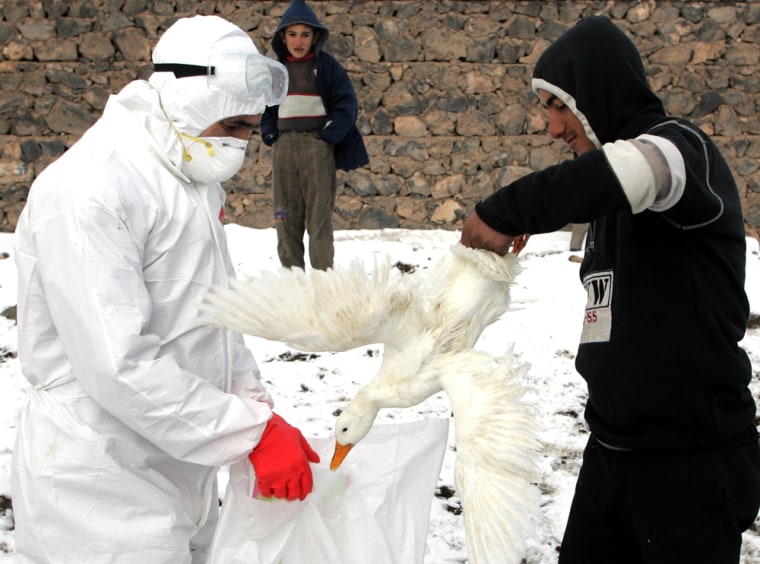Turkey’s fast-moving outbreak of bird flu prompted villagers across the border in Georgia to slaughter chickens, geese and ducks en masse Wednesday, while in neighboring Greece, Georgia and Syria, authorities beefed up border inspections.
In Russia, nationalist lawmaker Vladimir Zhirinovsky even urged men to grab rifles and shoot migratory birds to keep the virus at bay.
The European Union announced it would keep monitoring wild and domestic birds around the 25-nation bloc until end of the year, and a Swiss soccer club canceled a trip to Turkey.
The measures were taken despite assurances by the World Health Organization that there was no reason to panic and no evidence of person-to-person infection.
‘No reason to panic’
“The worst situation is a panic situation. There is no reason to panic,” said Dr. Marc Danzon, the WHO’s regional director for Europe. “There is no transmission from human being to human being through a mutation that could cause a pandemic.”
Danzon and Health Minister Recep Akdag again urged Turks to avoid touching or playing with fowl — a common factor in all 15 confirmed cases of infection with the deadly H5N1 strain of the disease.
The U.N. Food and Agriculture Organization warned the illness — which has killed two children and infected at least 13 other Turks — could spread to farm animals in neighboring countries.
“The virus may be spreading despite the control measures,” said Juan Lubroth, senior animal health officer at the Rome-based agency.
The head of the Paris-based World Organization for Animal Health, meanwhile, expressed doubts about the ability of Turkey and nations in eastern Europe to quickly detect and respond to bird flu outbreaks.
Health experts fear the virus could spawn a more potent strain easily passed between people and trigger a pandemic capable of killing millions. The WHO said Wednesday that bird flu had killed two more people in China, bringing the total number of humans killed by the disease in that country to five and pushing the death toll worldwide to 78.
Greatest risk in Asia
East Asia, where 76 of the world’s 78 confirmed human deaths have occurred, remains at greatest risk, said Dr. Shigeru Omi, the WHO’s top official in Asia. “Although there are new developments in Turkey, the situation in Asia is more serious than in any other part of the world,” he said in Tokyo.
Even so, “the risk is global,” Danzon said. “We need to exercise solidarity.”
Asked whether countries should ban or restrict their citizens from traveling to Turkey, Danzon said there was no reason to do so. “There is no danger to come to Turkey,” he said.
Three people died last week, but only two were confirmed to have tested positive.
“We hope that the numbers won’t rise,” Akdag said. “The whole issue is not to contact birds and not to let kids contact them.”
Turkey’s government ordered more than 300,000 fowl destroyed as a precaution. The Agriculture Ministry said Wednesday that bird flu was confirmed in poultry in 11 of Turkey’s 81 provinces and suspected in 13 others.
In the central Anatolian city of Sivas, where the latest human case was detected, officials checked 110 people and hospitalized seven. Two children also were hospitalized as a precaution in the Black Sea port city of Samsun, and three people in the Aegean province of Aydin.
“There are no other deaths,” Prime Minister Recep Tayyip Erdogan said Wednesday after meeting with the father of the children who died. “There are some cases that are positive and those are under control. Two of them are in serious condition but that will be overcome.”
Guenael Rodier, a senior WHO official for communicable diseases, said experts were monitoring the progress of H5N1 confirmed in two boys aged 5 and 6 who are hospitalized in Ankara but have not displayed symptoms. He called it the first time the deadly strain had been documented at such an early stage, and said the boys’ cases could provide useful clues about how the virus takes hold in humans.
Deniz Baykal, leader of the opposition Republican People’s Party, accused Erdogan’s government of not doing enough. “Not enough measures were taken,” he said. “They tried to keep the issue a secret. They denied it at first ... They said it was pneumonia.”
A senior U.N. official said Wednesday that about $1.5 billion is needed to help countries and international organizations fight bird flu and prepare for a possible pandemic in humans. Dr. David Nabarro, the U.N. coordinator on avian and human influenza, called on donors at an international conference in Beijing next week to contribute generously.
